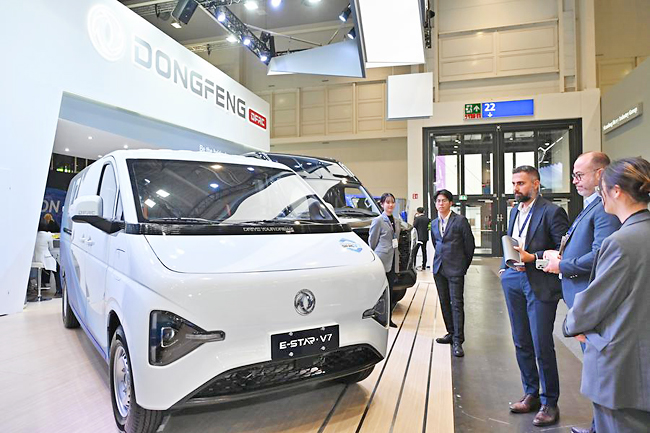HANNOVER (XINHUA) – The electrification of Europe’s commercial vehicle fleet has emerged as a key focus at the ongoing Hannover motor show, underscoring the automotive industry’s accelerating push toward zero-emission transportation.
The International Motor Show (IAA) Transportation 2024, one of the world’s leading commercial vehicle events, drew nearly 1,700 exhibitors from over 40 countries and regions.
The event brings together leading figures in the commercial vehicle sector to explore sustainable transport and logistics solutions, with a strong emphasis on achieving carbon neutrality.
Major European manufacturers highlighted the commercial vehicle’s growing shift towards electrification by showcasing new electric truck models at the event.
Daimler Truck presented the “eActros 600”, an electric truck with a range of up to 500 kilometres (km) on a single charge, while MAN Truck & Bus introduced a light-duty electric truck capable of covering over 230km, with fast charging achievable in just 30 minutes.

Despite these innovations, diesel trucks still dominate European commercial vehicle market, accounting for 95.7 per cent of new truck registrations in 2023. Electric trucks, though making up just 1.5 per cent, have seen a notable rise from 0.8 per cent the previous year, underscoring the sector’s gradual transition toward electrification, according to the European Automobile Manufacturers’ Association (ACEA).
“Electric trucks are starting to show a clear advantage in total cost of ownership,” said one expert. “Lower toll fees, cheaper electricity, and reduced maintenance costs make them a more attractive option, especially for certain transport applications.”
Markus Heyn, member of the Bosch board of management and chairman of the Mobility business sector, said Bosch sees significant opportunities in the shift to electric powertrains and plans to restructure its commercial vehicle operations to capitalise on this trend.
The push for electric trucks comes amid increasing regulatory pressure. The European Parliament has mandated a 45-per-cent reduction in carbon dioxide emissions from new heavy-duty trucks and buses by 2030, compared to 2019 levels. However, automakers caution that the transition will require significant improvements in charging infrastructure.
CEO Christian Levin of Traton Group, a Volkswagen subsidiary, emphasised that the lack of adequate charging infrastructure remains a significant hurdle. He also pointed out the challenges of securing necessary permits, ensuring a stable supply of green electricity, and addressing pricing issues.
According to Levin, all these factors must come together to ensure the long-term sustainability of electrification.
German Transport Minister Volker Wissing, speaking at the motor show’s opening, underscored the critical need for a robust charging network to facilitate the transition to electric vehicles.
Wissing outlined plans to establish 350 charging parks and 4,200 fast-charging points across Germany in the coming years, with the goal of electrifying one-third of the country’s road freight by 2030.
Daimler Truck, Traton, and Volvo have formed the joint venture Milence to address infrastructure concerns, announcing a plan to establish 70 charging hubs and over 570 high-power charging points across 10 European countries. The network will focus on deploying megawatt chargers, with operations expected to begin in 2025.
“Transport companies want to electrify their fleets, but local grid operators are struggling to provide the necessary capacity.
“We need urgent action to address these bottlenecks,” said president Hildegard Mueller of the German Association of the Automotive Industry (VDA).
Despite the challenges, automakers remain optimistic about the long-term prospects for electrification in Europe’s commercial vehicle sector, pointing to regulatory support and technological advancements as key drivers of future growth.







